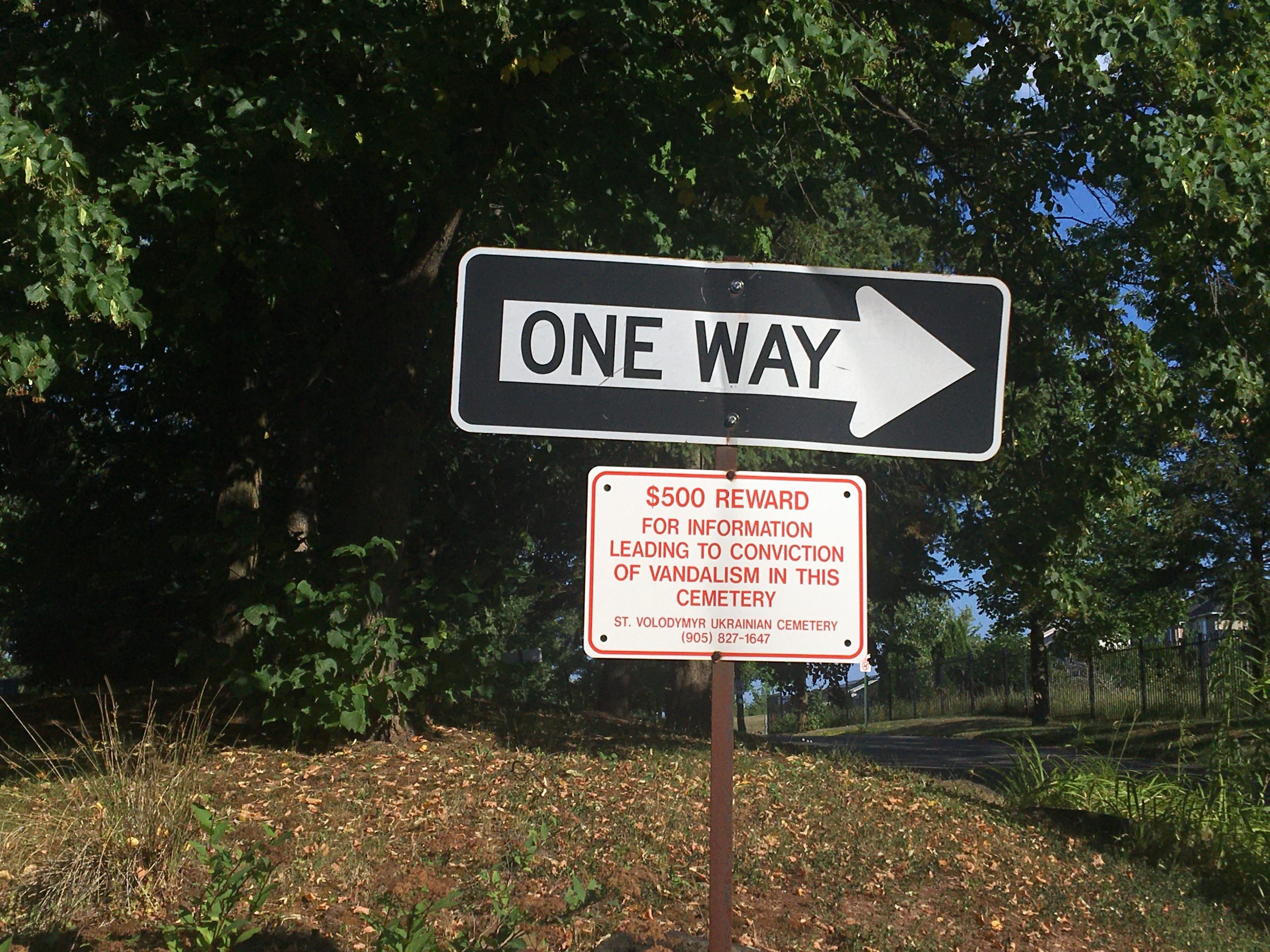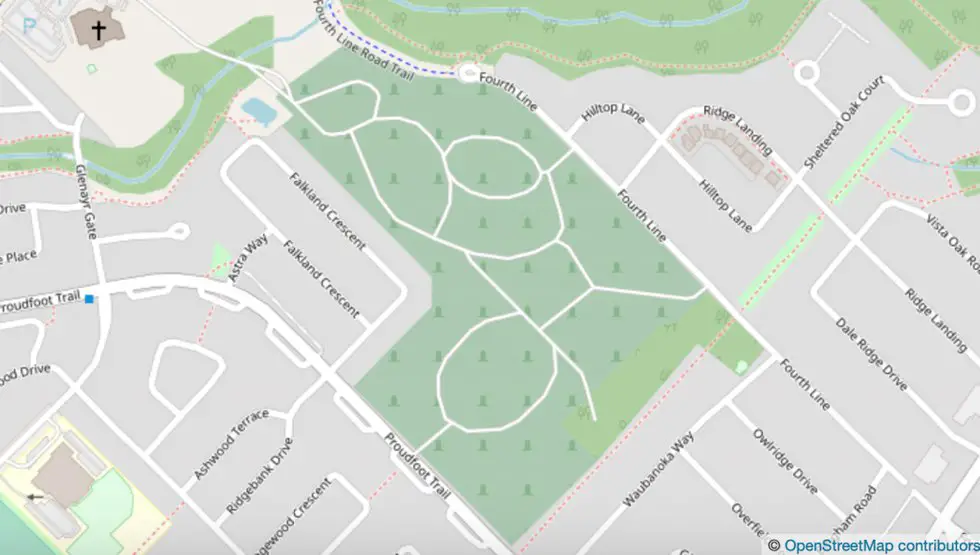Below is a story we published in July 2020, when vandals defaced this monument in our town. As you will read, the issue has more ambiguity than our initial article brought to light. But in light of the recent events on Parliament Hill, the topic is worth revisiting.
The monument to a Ukrainian Nazi Unit in World War II is still in the St. Volodymyr cemetery, right here in Oakville. This is the same issue that has embarrassed Canada on the world stage and provided propaganda fodder to Russia.
The Speaker of the House of Commons elicited two standing ovations for a man he called a Ukrainian hero but who, in fact, volunteered for this very Nazi SS unit to fight against the Russians, who were Canada's allies in fighting the Nazis.
Russia is running clips of this event in which Volodymyr Zelenskyy, the President of Ukraine, unknowingly applauds this individual as evidence of their claim that their aggression against Ukraine is motivated by the need to de-Nazify the country.
Canada couldn't have messed up more if we had tried.
The embarrassment we as a country are dealing with as a result of Speaker Anthony Rota's invitation to Yaroslav Hunka and singling him out as a hero stems from what must be decried as a widespread ignorance of history in our country, apparently not limited to the young people who deface statues as a way of demonstrating the moral superiority of the present over the past.
"If we open a quarrel between the present and the past, we shall find we have lost the future." (Winston Churchill)
The Russians were our allies in World War II. More than that, they bore the brunt of the fighting on the Eastern Front after the fall of France to Nazi Germany when Germany terminated a non-aggression pact with the Soviets and invaded Russia in 1941. This was in pursuit of Lebensraum, or space for living for the German nation.
For reasons mostly to do with being caught unprepared to face Hitler's actions, the other allies, Britain, Canada, the other countries of the Commonwealth, and eventually the United States, did not draw Hitler's resources by opening a Western Front for years, despite pleas from Russia.
Stalin's Russia kept the Nazis occupied.
Soviet losses, estimated at more than 20 million, far exceeded those of all the other allies combined in both absolute and population terms, forcing Hitler to spend both lives and equipment. They fought on their own soil. Without the Russian sacrifices in World War II, we might have lost that war, or at the very least, it would have taken many more years to bring Hitler's forces to heel.
The Russians were also the totalitarian government holding Ukraine back from its long-held aspirations for independence. Once the Nazis had overrun Ukraine, they sought to recruit (as they had done in other conquered countries) an SS unit to further their aims and combat on the Eastern Front.
Given a history of oppression under the Soviets and first-hand experience with totalitarian communism, the possibility of fighting against the Russians and perhaps earning Ukraine's liberation would have been an appealing narrative.
This desire for independence, and hatred of the Bolsheviks, rather than a zeal for Nazi values, was seen as the motivation for volunteering for this unit, and this is why on two separate occasions, Canada has ruled that members of the unit were not war criminals. That resulted in their being accepted for immigration to Canada when other SS members were not.
That said, the unit they joined was put at the service of Nazi aims. In fighting for independence and against the Russians, the 14th Waffen SS served the Nazi cause against the Allies swearing a loyalty oath to Hitler. "The enemy of my enemy is my friend" governed the Allied decision to combine with Russia. Still, that decision did not involve embracing a doctrine of racial purity or totalitarianism or participating in genocide.
Ukrainians who mistakenly saw the Nazi invasion as a chance for independence from Russia were soon disappointed, "Far from supporting Ukrainian political aspirations, the Nazis in August attached Galicia administratively to Poland, returned Bukovina to Romania, and gave Romania control over the area between the Dniester and Southern Buh rivers as the province of Transnistria, with its capital at Odesa. The remainder was organized as the Reichskommissariat Ukraine." (Britannica)
Russia is obviously no longer our ally. It is currently engaged in unprovoked aggression against Ukraine, and Canada is standing up for international sovereignty and the international rule of law by supporting Ukraine.
But things were different in 1941.
In a country where we are tearing down statues of Macdonald, Ryerson and others and renaming streets like Dundas, for which the justification is often a minimal understanding of their roles and of the history they made, the fact that we can find a monument to a Nazi unit still standing right here in Oakville fairly boggles the mind.
These men may have shown courage in battle, but whatever their motives or however misguided they were, they fought for the most reprehensible cause in human history.
Here is our coverage of the "vandalism" incident in 2020
One important detail to note is how this isn’t the first time the St. Volodymyr’s monument has been investigated, and since its installation the veterans named have been cleared of all charges and accusations of Nazi behaviour. These men, in fact, have been cleared of all war crimes three times since 1950.
The Ukrainian Canadian Congress clarifies: "In 1986, Canada’s Deschenes Commission cleared these veterans of any involvement in war crimes after a long and exhaustive investigation and public testimony before a Royal Commission."
"The Commission concluded in its report that charges of war crimes against members of the Galicia Division have never been substantiated, neither in 1950 when they were first preferred, nor in 1984 when they were renewed, nor before the 1986 Commission."
The full explanation and report from the Ukrainian Canadian Congress can be read online here.
What follows below is a reprint of Oakville News' reporter Thomas Desormeaux's 2020 investigation into the monument.
What was initially a story of vandalism and disrespect to the Ukrainian community has since transformed into a question about what type of symbols should be tolerated in Oakville.
Halton Regional Police said in a press release today that the message written on a controversial monument in Oakville's St. Volodymyr Church cemetery in June is no longer considered a hate offence.
St. Volodymyr Cemetery
The message was initially written on the monument on June 21. Police were called in to investigate on the 22nd. Someone wrote "Nazi war monument," referring to the fact that this monument commemorates a World War Two division of Ukrainians that fought as part of Nazi Germany's SS from 1943 to 1945.
The message's classification as a hate crime caused an uproar in many parts of Canada, leading to a Twitter storm and several national news stories.

Statement from the Police
"The initial information collected by investigators indicated that the graffiti may have been hate-motivated, targeting the identifiable group of Ukrainians in general," reads today's HRPS press release.
"At no time did the Halton Regional Police Service consider that the identifiable group targeted by the graffiti was Nazis."
The monument reads: "For those who died for the freedom of Ukraine."
However, many historians largely agree that the division's legacy is not a positive one. The division was accused of massacring Polish citizens and its members implicated in the prior murder of Ukrainian Jews.
Halton Police Chief Steve Tanner weighed in on the issue on Twitter, saying, "There is no support for the Nazi SS within Canada, nor should there ever be anywhere."
There is no support for the Nazi SS within Canada, nor should there ever be anywhere. The Nazi party/SS are by no means a protected group under any hate crime related legislation.The most unfortunate part of all of this is that any such monument would exist in the first place
— Chief Steve Tanner (@ChiefTanner) July 17, 2020
The Chief went on to clarify that Nazis are not a "protected group" that can be targeted for a hate crime. "The most unfortunate part of all of this is that any such monument would exist in the first place," he wrote.
Should the Nazi cenotaph be in Oakville?
Community leaders are also reflecting on what it means to the town. It's imperative as new information about the history of this monument comes to light.
"It seems complex at first," says Oakville Rabbi Stephen Wise. Rabbi Wise does not believe the issue is complex, just that this series of developments about the funeral monument has been particularly unusual.
"This cenotaph represents this Nazi killing unit that killed Jews in the Holocaust. It's kind of hard understanding why it's sitting in Oakville," he says. "It's a bit of an insult to Canada, the Jewish community in Oakville and really the Town of Oakville."
"It honours a dishonourable act - It honours Nazis," Rabbi Wise says. "It doesn't have a place in Oakville and should be removed."
Amidst the discussion, Mayor Rob Burton released a press statement today. He says that it is not within his power to remove the monument.
"Unfortunately, municipalities have no role in regulating the contents of private cemeteries," it reads. Burton says the memorial was "repugnant" to him and that he would have had it removed years ago if Ontario law had allowed it.
The investigation into the painted message is ongoing but is now considered only vandalism. Halton Police said it will continue updating the public through media releases.



